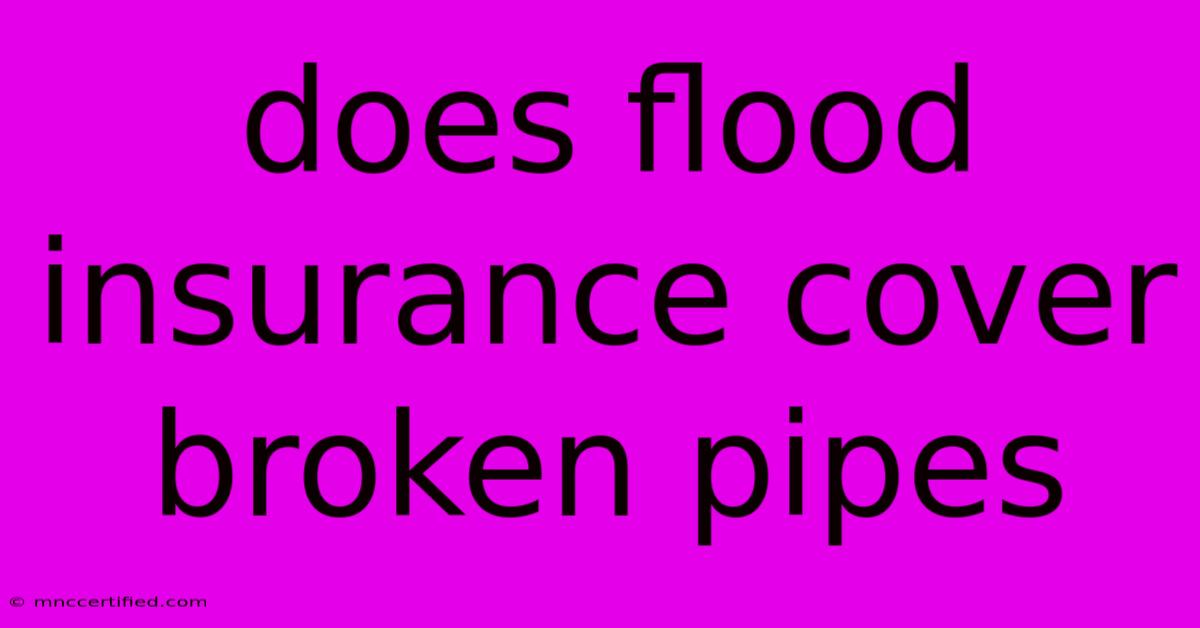Does Flood Insurance Cover Broken Pipes

Table of Contents
Does Flood Insurance Cover Broken Pipes? Navigating the Waters of Coverage
Water damage is a homeowner's nightmare, and the source of the damage can significantly impact your insurance coverage. One common question that arises is whether flood insurance covers broken pipes. The short answer is no, flood insurance typically does not cover damage caused by broken pipes.
Here's why:
Understanding the Difference: Flood vs. Water Damage
Flood insurance, as the name suggests, is designed to protect against damage caused by overflowing bodies of water. This includes:
- Rising groundwater: When the water table rises, it can seep into your basement or crawl space.
- Overflowing rivers, lakes, or oceans: Storms, heavy rainfall, or other natural disasters can cause flooding.
- Storm surge: This is the rise in sea level caused by strong winds associated with hurricanes and other storms.
On the other hand, broken pipes fall under the category of water damage, which is typically covered by your homeowners insurance.
When Homeowners Insurance Steps In
Homeowners insurance policies generally cover damage caused by:
- Leaking pipes: This includes leaks from pipes within your home, as well as those connected to your plumbing system.
- Water heater malfunctions: If your water heater breaks and causes water damage, your homeowners insurance should cover it.
- Frozen pipes: If pipes burst due to freezing temperatures, homeowners insurance will usually provide coverage.
The Grey Area: Water Damage from a Flood
The line between flood damage and water damage can become blurred when a flood triggers a broken pipe. For example, if a flood overwhelms your basement and causes a water heater to malfunction, it's not clear-cut whether the damage is due to the flood or the malfunction.
In such cases, it's crucial to contact both your flood insurance and homeowners insurance providers to determine the extent of coverage. They will likely investigate the situation and decide which policy is responsible for the damage.
Protecting Yourself from Water Damage
No matter the source of the damage, it's always wise to take proactive measures to minimize your risk:
- Regularly inspect your plumbing: Check for leaks, corrosion, and other signs of damage.
- Insulate pipes: This can prevent them from freezing in cold weather.
- Maintain your water heater: Regular maintenance can help prevent leaks and malfunctions.
- Consider a water leak detection system: These devices can alert you to leaks before they cause significant damage.
Navigating the Waters of Coverage
Understanding the differences between flood insurance and homeowners insurance is crucial for protecting your home and finances. While flood insurance does not cover broken pipes, homeowners insurance typically does. In the event of water damage, it's essential to contact both insurers to ensure proper coverage and minimize your out-of-pocket expenses.

Thank you for visiting our website wich cover about Does Flood Insurance Cover Broken Pipes. We hope the information provided has been useful to you. Feel free to contact us if you have any questions or need further assistance. See you next time and dont miss to bookmark.
Featured Posts
-
Septa Strike Update Workers Stay On Job
Nov 08, 2024
-
Gallaghers Golf Buggy 10 000 Auction
Nov 08, 2024
-
Watch Chelsea Vs Noah Conference League Guide
Nov 08, 2024
-
Farmers Insurance Open 2016 Leaderboard
Nov 08, 2024
-
Do You Get A Bond For Failure To Appear
Nov 08, 2024